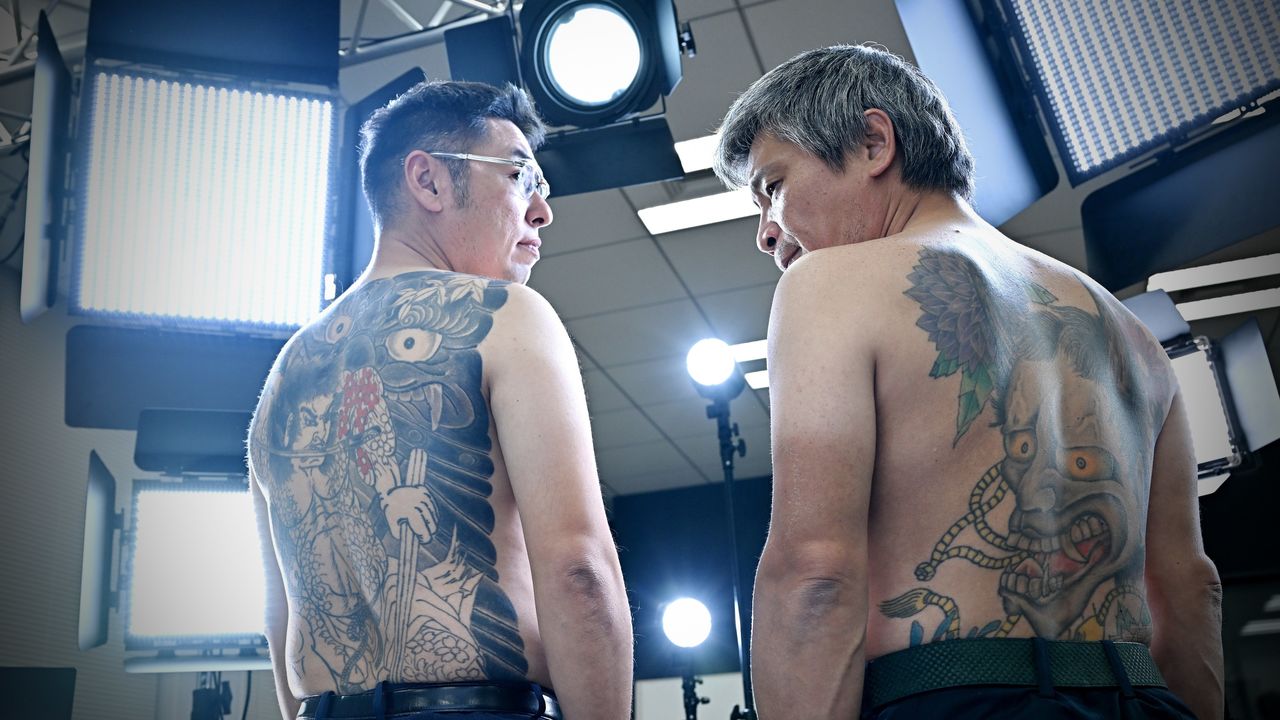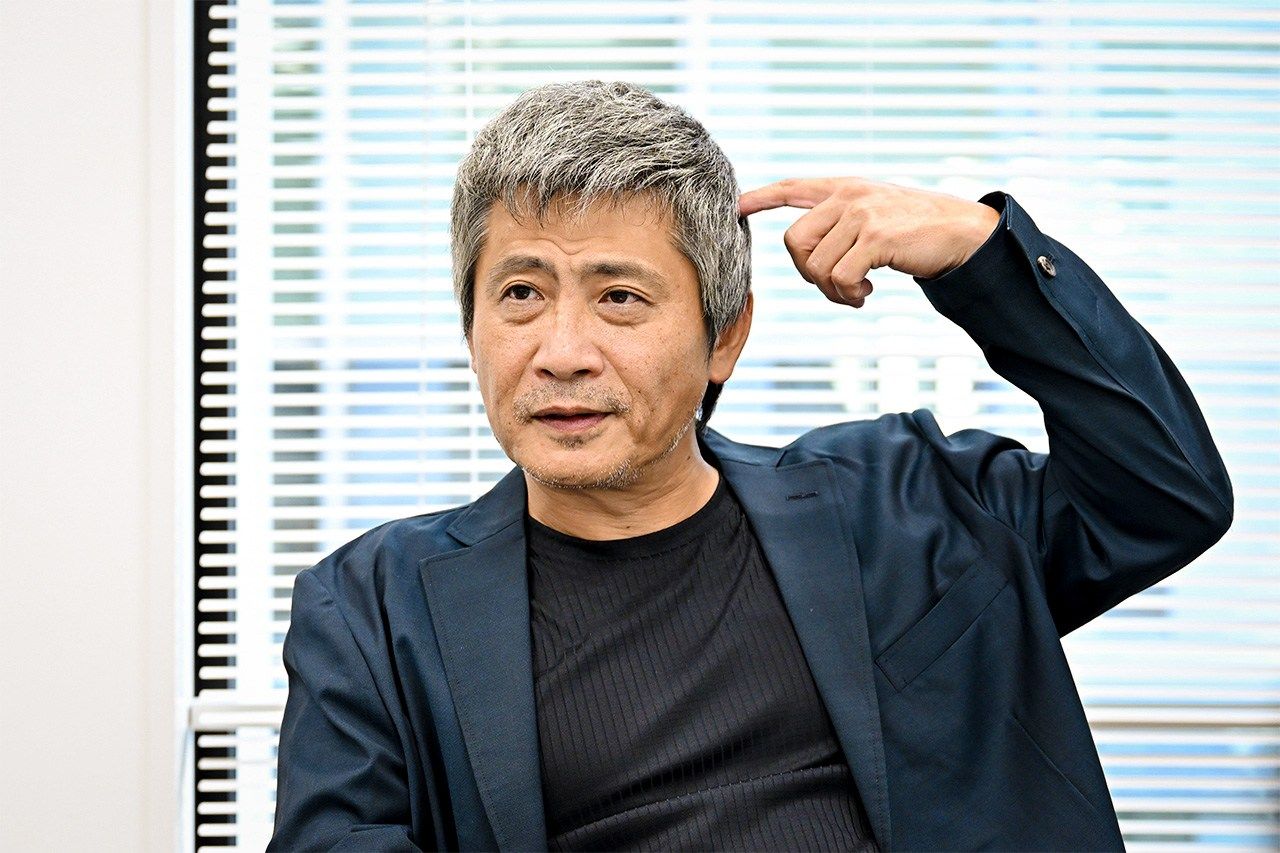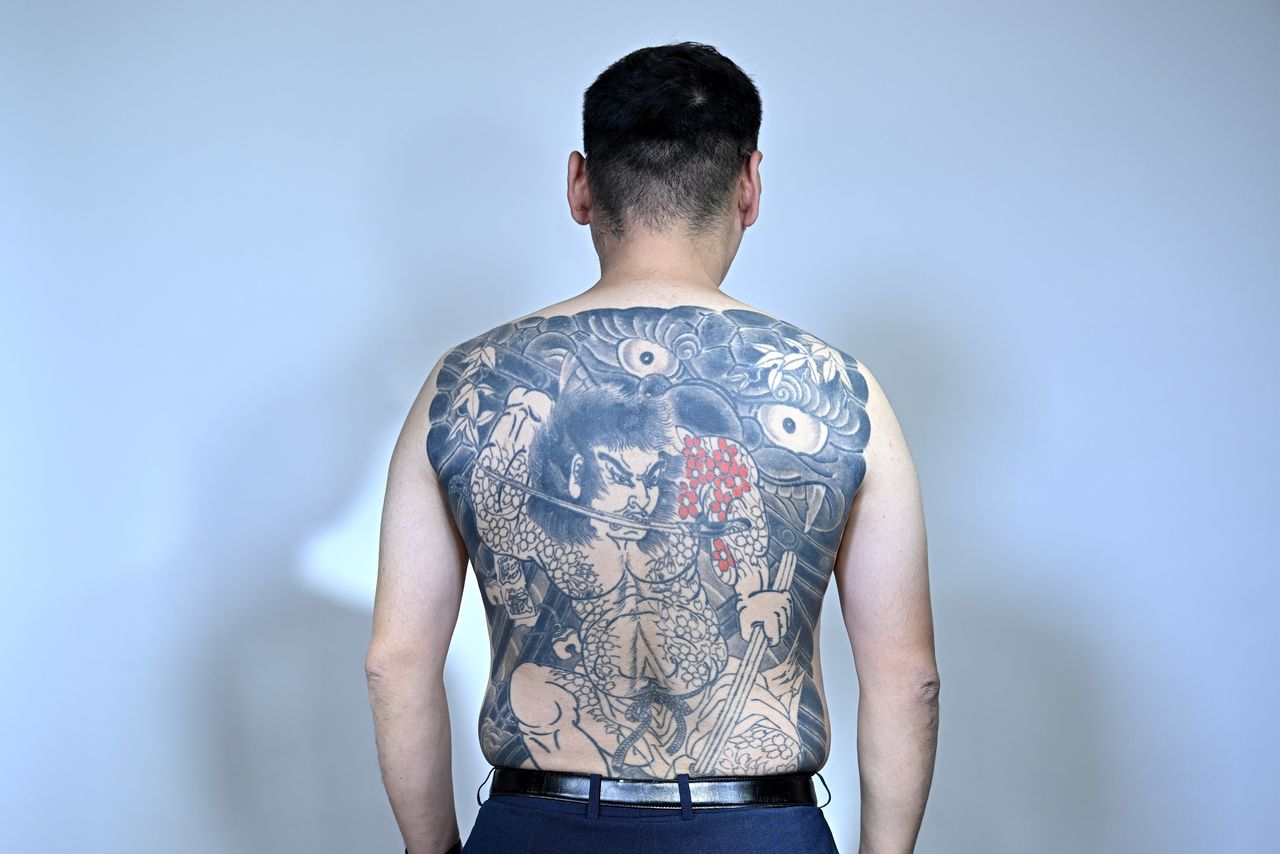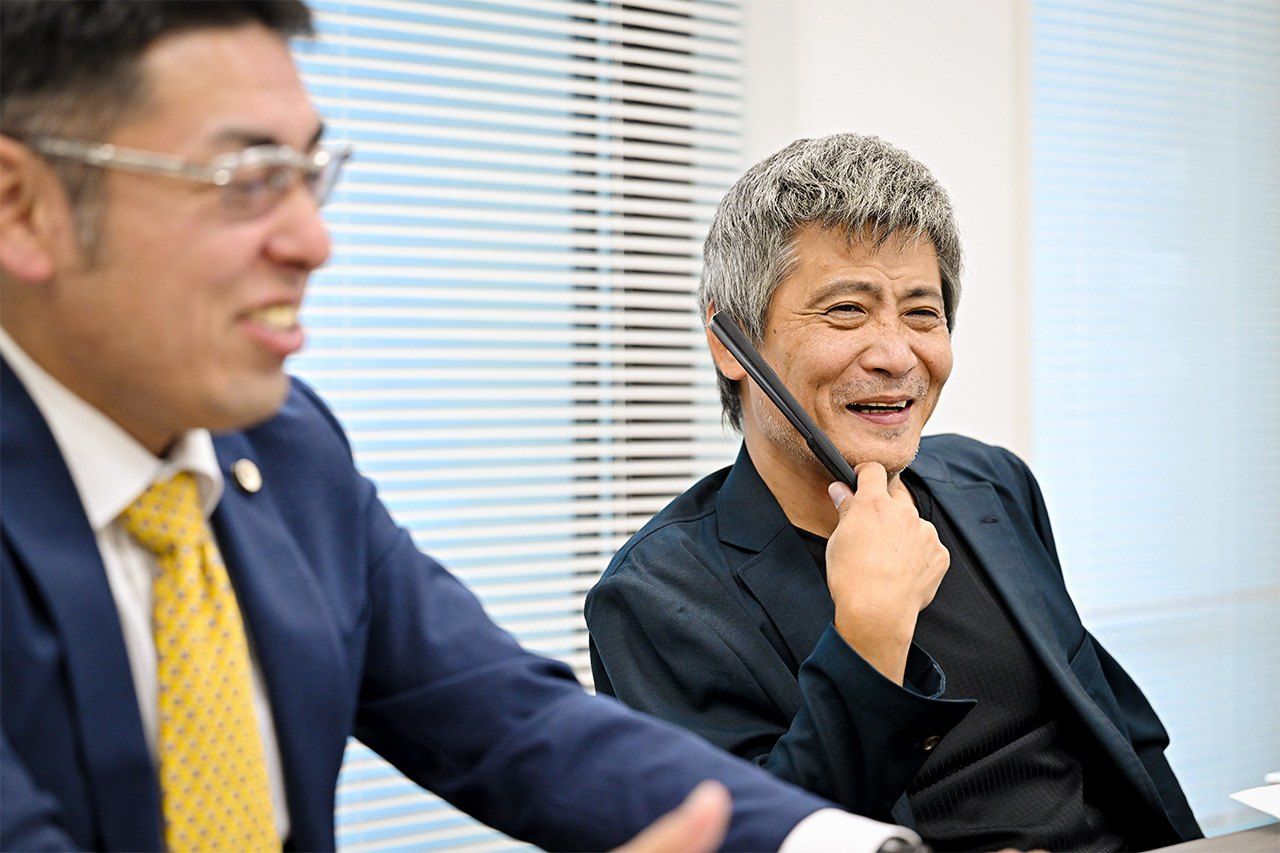
From Outlaw Status to the Legal Profession
Back Into the Light: Lawyer Morohashi Yoshitomo and Judicial Scrivener Kōmura Ryūichi Discuss their Yakuza Pasts
People Society Work- English
- 日本語
- 简体字
- 繁體字
- Français
- Español
- العربية
- Русский
A Gun to My Forehead
INTERVIEWER When did you two first learn about each other?
MOROHASHI YOSHITOMO The first time was in 2019, when I saw a news story about a former yakuza who’d passed the judicial scrivener exam. I had become a lawyer, but at the time I was still hiding my past. I was surprised that Kōmura was so open about it. I thought maybe I could open up, too. My decision to go on a YouTube program in April 2022 and come out as a former yakuza owes a lot to Kōmura’s presence.
KŌMURA RYŪICHI I learned about Morohashi from that video. I thought I was the only one with this background who got certified and entered this industry, so I was quite surprised.
MOROHASHI I was arrested for violation of the Stimulants Control Act but given a suspended sentence, while Kōmura actually spent time in prison. I had thought going to prison would be too big an obstacle to working in the legal profession, so it was interesting hearing about his success in getting past that. My book came out in May 2023 and his in June, so I used that chance to approach him, and we started talking.
KŌMURA We’re both former yakuza, but Morohashi earned by selling meth, while I mostly worked in loan sharking and debt collection. We took different paths. So, I was really interested in his background, and how he got to where he is now.
INTERVIEWER What underworld experience left the biggest impression on you?
KŌMURA This is something that happened around when I was working with the right-wing group I founded in 2003, but I was chasing after an active gang member to get back some money I’d loaned him. I pushed a little too hard, and suddenly he pulled a gun and put it to my forehead. I could tell by the feel of the muzzle that it was the real thing, not a toy.
The guy was really out of it, and the hand holding that gun was trembling. The things coming out of his mouth weren’t even words. I thought, “This guy might actually pull the trigger . . .” I kept saying, “OK, OK, just put it down.” I somehow managed to settle things. That was the only time I was scared. I remember how I was covered in cold sweat and my hands were clammy.

Kōmura Ryūichi. (© Ikazaki Shinobu)
INTERVIEWER I suppose you must have always been ready to risk your life, is that right?
KŌMURA There weren’t that many times where it seemed I might actually get killed, but I got sent to jail a lot. It was all for violent offenses. If someone picked a fight, I’d go for it, even if I knew I’d go to jail. I got jailed four times total in ten years that way. That’s just fate.
Tattoos: No Turning Back
MOROHASHI I’ve never had a gun pulled on me, but the yakuza have something called kakeai, and they always left an impression. Kakeai is what happens, for example, when two gangs have some kind of dispute, and maybe five people from each side gather and argue it out.
I was part of a few fights, so I got called out to attend several times. Kakeai is, in the end, just a spoken negotiation, but on the lower levels there are fighters on standby, and they could be hiding weapons. So, depending on how things develop, you could get taken away by the other side. Some yakuza have gotten into shootouts and even killed during kakeai. I was always nervous. But at times like that, the adrenalin was always pumping so I never felt the fear.
To be honest, I was a meth addict, and I was more afraid of dying when I was in my own room hallucinating. I was always imagining that someone was after me. Like the devil was out to get me.
INTERVIEWER You both have back tattoos. Can you tell us about them?
MOROHASHI I was around 22 when I got mine. All my delinquent friends had them, and if we went to the baths, I almost felt embarrassed to be seen naked without them. Of course, I thought about how once you do it, there’s no going back. At the time, I was a university student still on the fence about whether I wanted to join a gang. So, getting the tattoos would mean that I was fully on the path to becoming a yakuza.
After I did it, I hid them from my university friends. One time only, a friend accidentally saw them, and I remember feeling terrible about it. Once I had the tattoos, I just naturally saw my civilian friends less, and the pull of yakuza life got stronger.
KŌMURA For me, there was no particular reason or meaning. I was in my twenties, and I think it was just an age when I thought they were cool. Yeah, just cool. And when you go to prison, most of the active members have tattoos. So, if you say you’re with the gangs but you don’t have your own, it feels a little strange. When two yakuza get together and see each other’s tattoos, it turns into a bit of a showoff.
Deciding the Pattern
INTERVIEWER Morohashi, your tattoo shows the “Sluice gate entry” warrior scene from the Suikoden [the Chinese classic Water Margin], while Kōmura has a hannya demon. How did you pick your designs?
MOROHASHI It probably depends on the artist, but in my case, the artist’s room has a book of samples out to look through, and while I was waiting my turn, I browsed through them. I think I looked for about thirty minutes, and finally said, “This is the coolest, so this one, please.” It was like choosing a hair style at the salon. [Laughs]
I was a sloppy yakuza, and although I was supposed to go back to the artist once every two weeks, I kept skipping appointments and the artist got mad at me. I started to feel bad and just stopped going. So, now it’s partially just empty outlines with no color in parts. I’ll never go back to being a yakuza, but I still feel like I want to get those outlines filled in to finish it.
KŌMURA I chose a hannya because it’s a pattern not many other people have. At the time, lots of people got dragons and carp. You can order something unique, like even if you get something from the samples you can say, I’d like this part like this, and stuff. I just don’t like to be the same as other people.
I had originally planned to get my whole body, with my arms and chest done too, but if you start something like that, you can’t stop going until it’s done. And since I was going in and out of jail, I figured I shouldn’t commit to more than I really needed. So, I decided to just do my back. I’m really sensitive to heat, so I wanted to be able to wear short sleeves too, which is another reason. [Laughs]
If you get tattoos, there are bath houses and pools that you can’t go to, but I don’t really regret it. I don’t think there’s any need to erase something that’s already there.
INTERVIEWER Are there no times when you show your tattoos and people get frightened?
MOROHASHI Showing off your tattoos and scaring the regular folks, like something out of the movies or manga, would be pathetic.
KŌMURA I guess that all depends on the person. There are guys who show off their missing fingers or go into bars and talk loud about aniki or “the boss” or whatever. I usually wish they’d just shut up. [Laughs]
MOROHASHI For me, the tattoos aren’t there to show people, they’re part of myself. They feel like emotional support. It feels like the tattoo on my back is there pushing me on in competitions.
Lately I see young people with Japanese tattoos on their arms and chests who show them off in T-shirts, but their backs are clean. The feeling in our day was, first you start with your back and then spread out. But now foreign tattoo culture has crept in, and people are starting to think of the Japanese style as something to show off. Because the arms and chest are easier to show than your back. In other words, it’s a fashion thing. In a sense, it feels like the age where “tattoos equal yakuza” is over.
(Continued in “The Hard Path of Walking Away: Ex-Yakuza in the Legal Profession.”)
(Originally published in Japanese. Interview and text by Mori Kazuo, Koizumi Kōhei, and Power News. Banner photo © Ikazaki Shinobu.)


